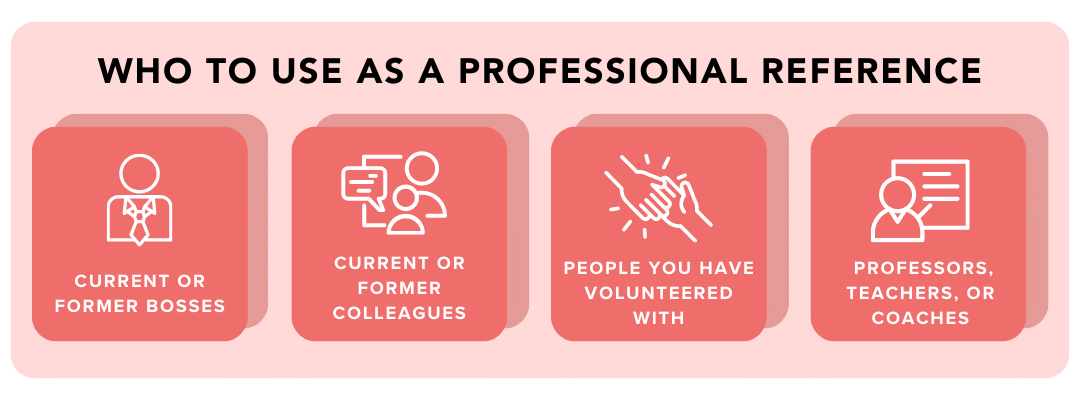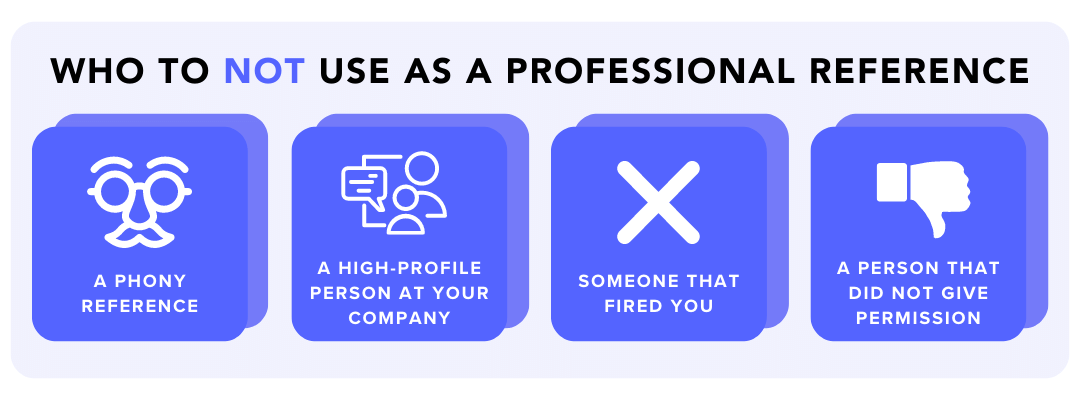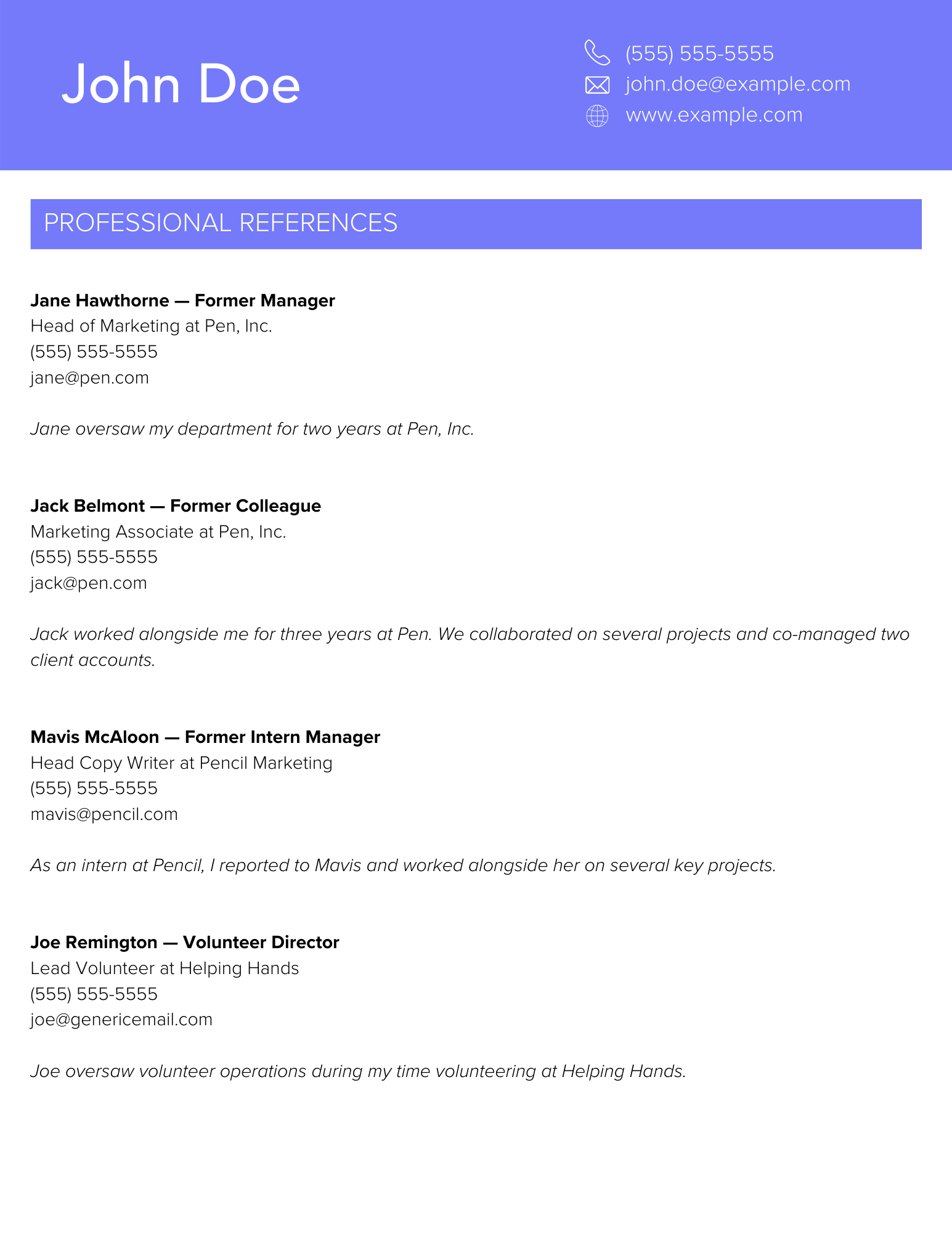Professional references may not be talked about as much as resumes and cover letters in the hiring process, yet a stellar reference can put you at the top of the list for a job. A bad professional reference, on the other hand, can be detrimental.
Putting together references can feel a little intimidating, so we’ve put together a guide that has everything you need to know:
- How many references should you have?
- Who should you use for references?
- Do you need to include references on your resume?
- How to format your references
- Professional reference example
How many references should you have?
Most job seekers should aim to provide three to four professional references, unless otherwise requested by the employer.
This is a good number to have because it provides potential employers with a good mix of people who can attest to your qualifications, work ethic, and character. Having too many references can be overwhelming for employers, and having too few can make you look unprepared.
Hiring managers may not call all of the references that you list, but giving them several to choose from will ensure that they get to talk to someone who can vouch for your qualifications. If someone misses the hiring manager’s call or forgets to respond to an email, they’ll have other people to turn to.

Who should you use for references?
Your professional references should be people who can speak to your experience, qualifications, and work ethic. They can be former employers, colleagues, or people who have volunteered alongside you.
Common references include:
- Current or former managers: Former managers make great references as they often have firsthand experience working with you and tracking your performance at work.
- Current or former coworkers: References need not be only those who managed you. Colleagues who have worked alongside you can also attest to your skills, experience, and work ethic.
- Current or former clients: Perhaps you’re coming from the world of freelancing. Even if you did not work with former clients on a day-to-day basis, they should be able to vouch for the quality of your work, communication, time management, and more.
Ultimately, you want to choose references who will speak highly of you and who you think will be helpful in getting you the job you want.
Who to use as a reference if you don’t have work experience
Coming up with references for a job application if you are lacking job experience may feel a little more daunting. Luckily, there’s no rule that says that any of your references have to be former managers or people you’ve worked with.
If you’ve never held a job before, you can use character references. These are people who can speak to your character and values, but may not necessarily have experience working for you.
Examples of character references include:
- People who you’ve volunteered with: Do you belong to a volunteer organization? The organization’s director or a fellow volunteer may be able to speak to your work ethic, punctuality, positive attitude, and more.
- Former professors, teachers, or coaches: Professors, teachers, or coaches can also speak to your work ethic, willingness to learn, and soft skills.
- Mentors: Have you been working with a mentor in the field you’re trying to find a job in? They can attest to your enthusiasm and passion for what you do.
- People within organizations that you belong to: Are you a member of a club or organization? People within that group can be used as references to vouch for your character and commitment.
Having trouble thinking of names? Go through your phone contacts, LinkedIn connections, or Facebook friends looking for potential references.

Who you shouldn’t use as a reference
There are a lot of people that you definitely should put down as a reference, and a lot of them should go without saying.
- A phony reference: Putting your friend’s contact information and saying they are your former boss, for example, is a no-no.
- Someone at your company that you don’t have experience working with: Perhaps you worked at Dell Technologies as a junior marketing manager. You wouldn’t use CEO Michael Dell as a reference. Having a high profile person as a contact isn’t useful if they have no actual experience working with you.
- Someone that fired you: Unless you want a bad recommendation, don’t use your boss that fired you as a reference.
- Someone who doesn’t know that they are a reference: Always, always, always ask a person if you can use them as a reference before sharing their contact information. Additionally, don’t assume that the references you used five years ago are still willing to vouch for you. Anytime you’re on the job hunt, make sure to check in with your contacts to ask if it is still okay.
Using friends, roommates, or family as a reference is also a gray area. It’s best to use someone who will give an unbiased opinion and have experiences with you outside of friendship or familial relationships.
Do you need to include references on your resume?
Unless a job application specifically requests that your references be included on your resume, you do not need to add them.
Your resume should be no longer than one page— adding references can take up a lot of valuable real estate! You can write “references available upon request” at the bottom of your CV, but it is generally expected that you have references ready if requested so it isn’t necessary.
How to format your professional references
There’s no one set way to format your references, but it generally includes the following information:
- Name of reference, company, and position
- Relationship to you
- Reference’s contact information (typically email address and phone number)
If you wish to elaborate further, you can briefly note anything that would be useful for a hiring manager to know. For instance, if you list a coworker, you may want to note significant projects that you collaborated on.
Professional reference examples
The following is an example of what your professional references may look like:

Find people who can vouch for your employers
References aren’t a one way street! While your potential employer is busy calling up your contacts and asking about your skills and work ethic, you can be doing some research as well.
Use employer review sites like JobSage to see what people have to say about the company you’re applying to. Do they have an inclusive work culture? Do they offer employees flexibility? Can you expect to grow at the company?
Look beyond a company’s values webpage and search for those who have firsthand experiences.
